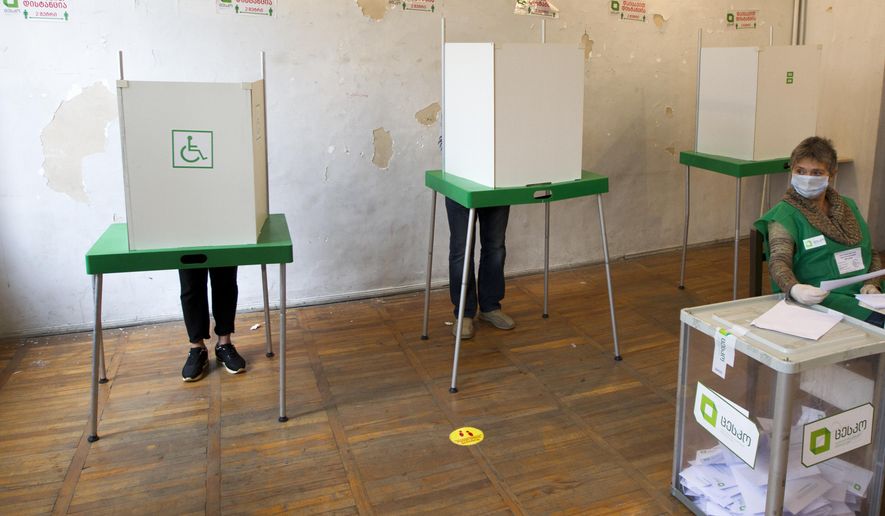Campaigns may not be allowed to coordinate work with political action committees and other outside groups. But that doesn’t mean PACs and other outside groups can’t coordinate with each other.
That’s just what is happening in Georgia’s two runoff elections for Senate on Jan. 5.
Behind the scenes, the groups that ring doorbells, operate phone banks and urge their voters to get out to the polls are meshing. That’s not always possible in the general election, where the campaign foot soldiers and backers working on behalf of candidates are scattered across the country. With all eyes on Georgia — and party control of the Senate hanging in the balance — that’s changed.
“You have a lot of conservative groups working in tandem,” said Bill Pascoe, political director of the Tea Party Patriots Citizens Fund, which is among the active groups in the Georgia runoff races. “That’s no easy thing to do, but it must be done as both sets of polls show things are dead even in both races.”
Georgia voters already got an eyeful for the candidates in the primaries and general election. The images are locked in the contests of Republican Sen. David Perdue vs. Democrat Jon Ossoff, and Republican Sen. Kelly Loeffler vs. Democrat Raphael Warnock.
The PACs and issue groups on each side now are working in unison to get out the vote.
On the liberal side, the Democratic-allied hotel and service industry union Unite Here is sending as many as 3,700 canvassers. An activist network established by former Georgia gubernatorial candidate Stacey Abrams, which includes Fair Fight, the New Georgia Project and Georgia Shift, also is ramping up its efforts and operating under the “#WinBothSeats” umbrella.
Former Democratic presidential candidate Andrew Yang, who in March launched the activist group Humanity Forward, announced on Twitter his family was moving to Georgia to vote in the Jan. 5 runoffs.
There is no evidence, however, that Mr. Yang or any other left-wing celebrity activists have followed through on moving. Establishing residency for voting is a felony in Georgia, although it’s unclear how that law would be enforced.
#WinBothSeats has celebrity and monetary power behind it, boasting of support from former NBA star Dikembe Mutombo, actress Sophia Bush and Wall Street billionaire Michael Novogratz. It raised more than $700,000 within 24 hours of launching on Nov. 12 and said its ultimate goal is to contribute $2.5 million to these boots-on-the-ground efforts and is more than halfway there.
All of this work is beyond the high-profile PACs and the like that are pouring money into the runoffs. For conservatives, then, there are groups beyond the GOP’s Senate Leadership Fund such as Mr. Pascoe’s organization.
The brigades of volunteers and paid operatives are particularly important in an election both sides believe will be decided by turnout.
While the hundreds of millions being spent on media could have an impact in close races like these, it is the work in the trenches that makes the biggest difference, according to Andra Gillespie, a political science professor at Emory University.
“It takes money to stage a successful get-out-the-vote operation, but I argue that get-out-the-vote is essential to determining the outcome of the Georgia runoffs,” Ms. Gillespie said. “Whichever party has the strongest get-out-the-vote operation will win.”
Understandably, the Democratic operatives are chiefly active around Atlanta and other urban areas, while Republicans have said they must get out the vote in GOP strongholds across rural Georgia.
Two questions gnaw at the operatives involved in Georgia, according to discussions with people involved with outside groups on both sides.
First, how much untapped turnout potential is left? Turnout for the 2020 elections was at record levels, with roughly 5 million people casting ballots in Georgia.
Some of the glamorous liberals backing Mr. Warnock and Mr. Ossoff, such as Mr. Novogratz, have tweeted claims that “Georgia still has 700,000 unregistered minority voters.”
The second question is whether with the presidential race no longer atop the ticket, will the motivation that drove voters on Nov. 3 hold strong on Jan. 5?
Given there were fewer votes in the Senate races than the presidential contest, particularly in the Senate races, it could mean antipathy to Mr. Trump was a driving factor of the eye-popping turnout.
In the handful of previous Georgia runoff elections for Senate, turnout dropped 40% to 60%, although those races were far lower-stakes.
• James Varney can be reached at jvarney@washingtontimes.com.




Please read our comment policy before commenting.